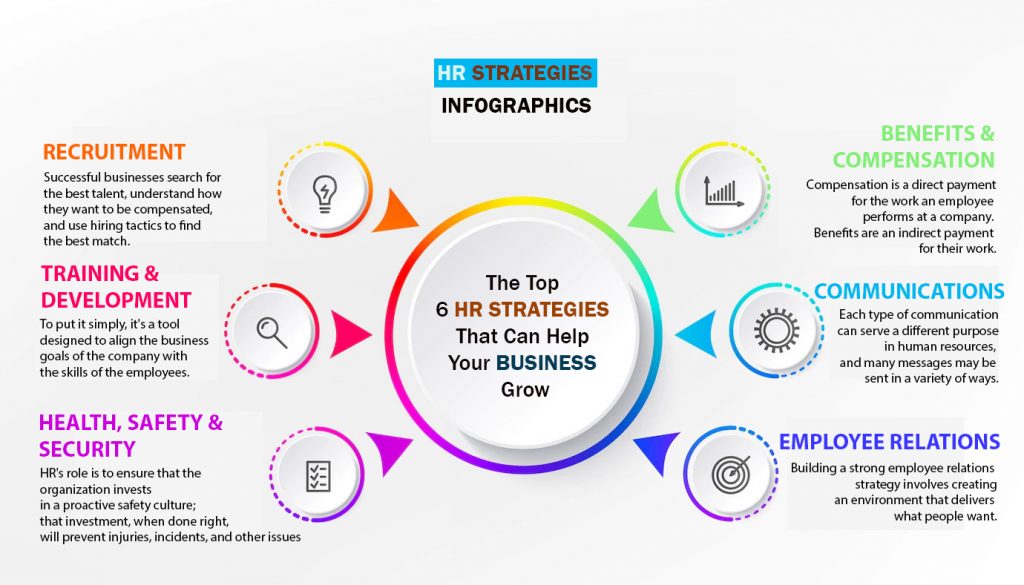HR strategy is a roadmap for solving an organization’s biggest challenges with people-eccentric solutions. This approach requires HR input when creating the policy and elevates the importance of recruitment, talent management, compensation, succession planning, and corporate culture.
The Top 6 Hr Strategies That Can Help Your Business Grow
While every HR professional dreams of a perfect workplace filled with pleasant, friendly colleagues and high-flying business goals, for many it will never be that way. However hard we try; our businesses are always in competition with each other.
It’s almost impossible to outdo your competitors. But even though the landscape has changed, the need to succeed hasn’t. We’re still being rewarded for working hard and playing by the same rules as everyone else.
So, what if you follow these 5 HR strategies? You’ll be successful no matter where you are or what industry you work in – just remember to keep trying (and working hard)!
Hiring Great Talent is Key
Successful businesses search for the best talent, understand how they want to be compensated, and use hiring tactics to find the best match.
But How Do you Find the Right People to Work for You?

Do you know how to pick the best talent? If not, you’re in trouble.
Successful businesses recognize talent and build teams around it. This is because the best people want to work for brands that make an impact. A strong sense of purpose and an unwavering drive to succeed are the foundations for successful teams. If you want to build a winning team, you have to find people who have the same motivations and are driven by the same goals as you do.
Frame the Right Goals
When recruiting for roles, always frame the goals of the position you’re seeking. This will help you find the most suitable candidates for the role.
If you’re a product manager trying to build a team of senior product managers, set goals for the position that is similar to the goals of the team.
Beyond setting goals, be sure to communicate the importance of these goals to all members of the team. This will help them all feel included and keep the team’s focus on the right thing.
Always Do the Right Thing
Doing the right thing has many faces, but it always comes back to its consequences. And doing the right thing has a price. You have to be willing to pay for it.
If you select the most talent-rich applicants, you’ll still be left with a minority of good ones. The best-case scenario is that one in ten will be perfect for your company.
But What if You Select the Wrong People?
What if you select people who aren’t cut out for your company culture or your role?
You have to be willing to let go of the outcome you want and accept the consequences of your actions. If you have a reputation for being a fair and open-minded organization, you’ll attract the best talent.
But what if you don’t? If you select the most talent-rich applicants, you’ll still be left with a minority of good ones. The best-case scenario is that one in ten will be perfect for your company.
But what if you select the wrong people?
What if you select people who aren’t cut out for your company culture or your role?
Don’t Be Afraid to Delegate
We often think of leadership as a top-down issue. But many problems can be solved at the level of the employee or the team. And while a CEO’s ears might be burning to hear about issues at the office, the feelings will be much less intense if the issues are solved at the team or individual level.
When it comes to delegating tasks, it’s better to ask for forgiveness than permission. If you have to ask a subordinate to do something, it’s likely that they aren’t up to the task. If you have to ask a subordinate to do something, it’s likely that they aren’t up to the task.
This can be a big problem when you’re short-staffed or overworked. You need people on your team who can do the job – not just the tasks that the team needs to do, but also the tasks that the individual has been put in charge of. You have to be willing to let go of the outcome you want and accept the consequences of your actions.
Conclusion
HR strategies are essential to the success of every business. They can help your business to grow, survive, and to be more successful in the marketplace.
But these strategies can only work if you keep applying them. The more often you apply these strategies, the easier it will be to succeed for your business.
It’s not an easy path and it won’t happen overnight. But with a little effort and a lot of striving for excellence, you can succeed in your quest for the top.







